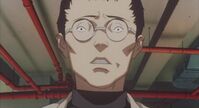Abstract: It has been more than ten years since Jin Min passed away, and his legacy still inspires countless animation scholars to actively explore, and the author is also one of them deeply inspired by it. But Director Jin Min is an easily misunderstood director, yes, not that his work is difficult to understand, but that he is full of too many clichés that seem to be correct, and he gives a happy illusion of half-understanding.
If you happen to read some of Jin Min's essays, you will find that these essays are either overly touted about narrative techniques and visual forms, or they are vainly searching for the truth in the mire of the plot. Of course, all of the above may be important, but as a fan, what I value most is the beliefs the author wants to convey and why these beliefs are so moving.
This article will interpret the work "The House of Weima" in the form of entries one by one. If I have a few words, please correct me.
electronic avatar
What kind of existence is the phantom Mima that appears in the movie? Many people see it only as a schizophrenic hallucination, and think that the animation is just an intuitive visualization of the dilemma of the dual personality, and regard it as one of the main features of Konto animation. However, the discovery and recognition of "dual personalities" is relatively recent in history. After all, to make people accept that there may be another conscious personality in the body requires a common fictional gap. If it is not for religious reasons, then it is a response An obvious lack, for example, was the Enlightenment thinker Diderot who first invented and preached the dual personality: for the transcendence of the aesthetic realm, we must imagine that the artist has a divinely enlightened person outside the ordinary everyday rules. "Personality".
The true and false story, that is to say the doppelgänger story, is one of the most enduring motifs in human history and the most favored theme in romantic literature. The story is generally the hero and his own. The battle between shadow/mirror, the arrival of the other person first means full-scale competition and the disintegration of relationship with the real world , followed by the protagonist's swing in delirium and madness, the result is often a competition of romantic relationship and damage, or pay the price of life for it .
The sci-fi variant of this motif, "the electronic doppelgänger", originated from the discovery of bioelectricity at the end of the 18th century, suggesting that if electric current can stimulate frog corpses, then the forbidden in vivo experiment is The next possible area. The ghost stories told by the Shelleys and Byron in the seaside villa in the early 19th century were also the starting point of science fiction literature: "Frankenstein" became an enduring ancestor of artificial humans thanks to bioelectricity. When Dr. Lankenstein tried to escape to the North Pole, he might have longed for the Earth's magnetic poles to dissipate the power of the android. What really brought the term to life was a generation of 20th century occult masters known as rudolf steiner, who claimed that after the 1840s an "electronic avatar" arrived just moments before everyone was born, with a Mephisto-like appearance. Wisdom but incapable of overcoming death, and will be transferred along with the manipulation of electrical equipment. Today we call this kind of existence AI, but before that, it was just a virtual personality born from the id network, perhaps in Baudrillard's language Call it "The Man in the Mirror's Revenge ".
a room of one's own
The phrase was taken from a collection of speeches by Woolf, in which she said that if a woman wanted to write, she had to have money, plus a room of her own, which today might be a homepage of her own . The so-called "Weima's House" is both a room and a homepage. If we recall its English name perfect blue, the perfect blue in the film only exists in a blue-screen computer similar to a fish tank.
It is no accident that in "My Dreaming Road", Jin Min respectfully refers to the Macintosh computer involved in the film production as Mr. In fact, Weima lives in this dangerous Internet world. At the beginning, we got a hint that a BUG KING who fled would come to take revenge, and then Weima became a Trojan program and was attacked by The faulty attack of the umbrella program, the four awakenings were the crash and restart of the consciousness system. Jin Min lives in the dawn of the personal computer. He may have heard of the personality representation of the "id network" described by the pioneers of the Internet. Perhaps as early as the 1990s, Stephenson's cyberpunk novel "Avalanche" narrated "" The "isomorphism of human and electronic system" has been widely circulated in the circle of friends.
imitator
It is useless to argue over who is the murderer in "The House of Weima", because "imitation" is the original sin of this type of story. Don't listen to Aristotle's naive concept of "imitation", that is, learning instincts. Children know that if the opponent blindly imitates your behavior, you will want to give him a punch. Imitation leads to competition, competition intensifies imitation , Wei Ma's clone accuses Wei Ma that she is not like the "real Wei Ma", like a mirror jumping up and saying that you are not like your photo, but the "real Wei Ma" is Unattainable, imitative actions thus lead to real violence, and the security guard becomes the security guard Danto cites in The Transmutation of Ordinary Things: he can rescue every single person in the museum warehouse in the fire. A work of art, but he couldn't tell the difference between the real and the fake in the warehouse. The "imitation criminals" mentioned here are not motivated by the imitation of violence on the surface, but the desire to commit crimes in the competition of catching the pair accelerated by the desire to imitate sex .
Having said that, isn't the original sin of science fiction literature also imitation? "Frankenstein" crosses the boundary of imitation of God's creation of man. If we think about the latest Alien series, it becomes clear that engineers, androids, and humans all think each other has violent tendencies. In fact, it is only because these three are gradually mixed in the imitation sequence. Jin Min's last book The comic opus is about the same theme, the creation and the creator are too similar. "The Uncanny Valley" isn't just a marginal theory of personality, it's even the most obvious theoretical effect in a double story.
It is useless to argue about the murderer in the world of Weima, because the murderer is the glamorous idol herself, and because she sows love and hope, she also sows black seeds. To sum up with the words of "Delusional Agent", "Give Ma Lumei, there will be a baseball boy", light and shadow follow. In order to reassure the real criminal, the agent was in fact forced to impersonate the "initiator" of the incident, playing the role of a disgusting imitator, a perfect scapegoat. Wei Ma also gained her own "health" because of this, and she excreted her manager as a tear. At the end, Mima gave a sly smile to the rearview mirror, and things seemed to get worse, as she successfully forged an alliance with the mirror.
"Double Bondage"
This is the name of the TV series Weima was involved in in the film, and it is also a psychological term considered by a British anthropologist, Gregory Paterson, to be the origin of schizophrenia symptoms. The PUA talk, which has been hotly debated a while ago, is a form of double bondage, which means that one person sends contradictory messages to another person at different levels of communication at the same time, and the other person must respond, but no matter how he reacts, All will be rejected or denied, which can easily put people into a dilemma.
Trapped in this situation, Wei Ma simultaneously releases two opposing messages, on the one hand she must cater to the audience's desires, on the other hand she has to thank them for their help; and in her relationship with the electronic avatar, in a "mimicry". I/don't imitate me" dual-command trap, which in turn leads to more interaction in the pursuit of difference.
Since the days of Romanticism, we have been mired in double bondage. In order to pursue the highest expression, the artist must fall to the lowest point of the muddy gravel road. Doom finds its romantic halo. In the 19th century, tuberculosis was regarded as the disease of genius, and in the 20th century, mental illness took over. Only a kind of pain can confirm its own existence.
actress
If you want to trace the origin of the Konami animation universe, it is necessary to visit the steel rose planet in the "Memories Trilogy" in which Jinmin first took on the important role. "Mrs. Butterfly" is an electronic incarnation at the end of the century, yes, she is a ghost living on a computer; "Mrs. Butterfly" is a "mock criminal", yes, this ghost always imitates murders according to long-term memory; "Mrs. Butterfly" is a self-turning planet, forming its own image sequence, yes, just like Chiyoko. The trajectory of the actress is the barometer of Jinmin animation.
Another David Lynch, who is based on the situation of actresses, likes to say: "stars make dreams, dreams make stars" Stars do not light up the night, the stars are our nights, especially in the daytime, this night is even more so. Bizarre , and it doesn't matter if it's a dark night in Hollywood or a dark night in Tokyo. In the anthropological sense, "idolatry" is a fatal disease, and the city-destroying tragedy in "Delusional Agent" is the most obvious example. On the contrary, Chiyoko in "Millennium Actress", she created a completely dark night for herself, and the eternal rotation trajectory she set for herself gave her purity and freedom.
depth
Jin Min's works have been dubbed as profound masterpieces, standing out in the crowd of animation genealogy. The question is not why other animations don't have depth, but why do animations need to have depth? In my personal understanding, because the appreciation of depth itself is a romantic invention, those who are good at using shadows to describe light understand depth, those who are good at capturing time with space know depth, and the introspective symbol chain of unrestrained introspection creates depth; because Unlike movies, animation has to create its own depth with appearances. In flat painting, we use overlays to create the illusion of space, and use the sequence and overlap of images to give characters depth —this is the unique depth of celluloid animation. . Yes, Chiyoko is a simple character, but she actually has the overlapping of many character deformations spanning thousands of years. Once she runs, every frame will be new, just like you overlap and cycle the trajectory of the moon to get a flower that blooms continuously. The lotus, in anime and manga, depth is a flat dream .
To say that Jin's work is about the eternal mystery of the human mind from myth to science fiction is true, but that's not the same as the truly puzzling psychedelic mania, (there are still some lunatic directors). Jin Min believes in the stable structure of the universe. He understands that "there are no mysteries that cannot be solved, and riddles that cannot be solved have no answers" (from the end credits of the last episode of "Delusional Agent"), if you ask "Millennium Actress" Why Chiyoko can't see the painter, that's because the moon rises and the sun sets . His infinity is predictable and has a home to return to. When we're done enjoying the film's labyrinthine construction, the last thing we fall in love with is the heroine's candid gaze, the missing ingredient: red peppers.
secret
"Weima's House" is a film about secrets . In the Internet age, we create our own secrets. This is a story about a girl who is hunted down by her secrets. Snowden and we are contemporaries, and he asked us to imagine that in the future our wars are all secret wars in some way, our secrets, other people's wars.
A "secret" is not an important matter that is self-generated, but can be anything to be hidden from people. Primitives don't believe in secrets, because everything is a miracle, and secrets are an invention of subjectivity. Foucault's panorama architecture has allowed "secrets" to ferment into today's scale, but having secrets doesn't mean not talking about them It (not at all a Freudian structure of repression), on the contrary, to talk about it with a different passion, to record, organize, file step by step in the form of a confession, we make ourselves sick, we treat with glee , we are people with secrets.
Jin Min has a contradictory view of secrets, that is, never take ulterior black hobbies as your secrets, and good secrets are always perfect and expressible. In "Red Pepper", Oedipus plays Oedipus and Red Pepper plays Sphinx. Those who want to protect the secret realm have nowhere to kill themselves because of the exposure of secrets, and "Red Pepper" is also Maeda Atsuko's docile Sphinx She is conspiring with the whole world , surrounding her internally, worrying about her, advising her, guarding her secrets, and in essence, her secrets themselves.
This is both a curse and a blessing. Don't wake up when you grow up. Those scorching black secrets have shaped you. If we sincerely inject our own affection into an avatar, let her/ Let him be his guardian angel .
Finally, I want to talk about why Freud's approach doesn't work, he's going to make us think the whole Wei Ma drama is just a two-person stage play, just an insanity of the star in distress, he's in some kind of diabolical The genius who reintroduced Oedipus to the masses (now we know that Oedipus was only a prime scapegoat because of the plague in the city-state) drags us to the protagonist's parents whom we never knew, but has no interest in the same He turned a deaf ear to the real encounter and competition. In Dostoevsky's "The Brothers Karamazov", he only saw the killing of his father, ignoring the stories of the other three brothers, and completely ignoring Dostoyevsky's original novella "The Twins". Brothers", a double body story (it's ridiculous that the more mainstream translation of this work in China is "Double Personality", double body and double personality are really not the same thing). At the end you find yourself morbidly satisfied in this film, both sympathetic and excited, the whole structure and context of Weima in psychoanalysis is buried. Beware of geniuses who believe they have come up with "man's secrets".
View more about Perfect Blue reviews










